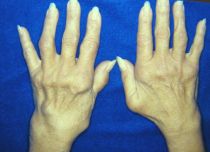Rheumatoid Arthritis
Rheumatoid arthritis is a systemic (body-wide) condition that affects bones, joints, tendons and ligaments. Its cause is unknown but it is probably an auto-immune disease, where the body’s immune system attacks one’s own body. It can occur at any age, though the course of the disease is often different if it starts in children rather than adults.
The progression and severity of the disease can vary significantly. In the hand and upper extremity, the wrist, finger, elbow and shoulder joints are most often affected. In addition, the presence of the disease around tendons and nerves can lead to nerve compression syndromes as well as tendon rupture. Joints can swell, become warm and tender, and stiff. As the rheumatoid disease progresses, synovial inflammation causes destruction of cartilage and tendon tissue. This can lead to joint pain, limitation of motion and tendon rupture.
Medical treatment of rheumatoid arthritis has progressively improved. Such medications are prescribed by rheumatologists, internists and family practitioners. If the medications fail to adequately control the disease, joint and tendon problems may ensue and require surgical treatment. One of the most common conditions in advanced rheumatoid arthritis is “ulnar deviation of the fingers.” In this condition, the fingers tend to be tilted towards the little finger side of the hand, in a “windswept” appearance. This can be very debilitation as the tendons no longer can effectively bend and straighten the fingers if the joints are incompetent.
Many of these problems can be effectively treated with careful surgery. Re-alignment of the distorted joints can restore function. Decompression of nerves affected by adjacent swelling and synovitis can prevent further potentially permanent nerve damage. Please consult with us if you believe you are suffering from deformities of rheumatoid arthritis despite appropriate treatment with medications.



